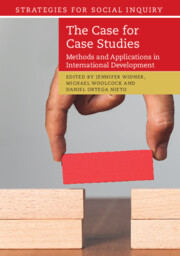This volume was conceived, as we suspect are many such ventures, during an informal conversation – in this instance, in Berlin in December 2014, at the launch of the Global Delivery Initiative.Footnote 1 All three of us were engaged with different aspects of international development, and were producing or using case studies with some frequency, but we found ourselves noting that while case studies remained widely deployed across the social sciences, and that expressions such as “the case of” were ubiquitous even in everyday speech, case studies per se remained in something of a residual methodological space: they were popularly conceived as “qualitative,” for example, yet one could find many instances in which the constituent elements of a given “case” in economics were exclusively quantitative (or in medicine, for example, physiological; or in law, jurisprudential). If a singular case was indeed primarily qualitative, the key question asked by Christian Lund – “Of what is this a case?”Footnote 2 – still remained to be answered, which logically meant that the case had to be connected in some way (empirically, theoretically) to broader instances or manifestations of a phenomenon. Was this a “typical” case? A randomly selected case? An outlier? How does one know?
Moreover, if a common critique of case studies was either that their underlying methodological quality was highly variable (selection bias! selecting on the dependent variable!), or that generalizing from them was at best problematic, then there surely needed to be a serious scholarly response to such concerns. Can causal inferences reasonably be drawn from a single case? If so, under what conditions? In development practice, when and how can policy-makers reasonably presume that a demonstrably successful intervention in one context might generate similarly impressive outcomes elsewhere, or if massively “scaled up”? For their part, social science methodologists have in fact made impressive advances on these fronts in recent years, yet much of this analysis remains disconnected from development practice and/or grounded in comparative “cases” of large meta-categories of country characteristics – “democracy,” “revolutions,” “constitutions,” “rule of law” – that are not the units of analysis at which the vast majority of practitioners think and act about development problems and solutions (which is: how to design and implement particular policies/projects that will achieve particular development objectives for particular groups in particular places despite numerous constraints and likely some form of political opposition). In short, we discerned two serious mismatches: first, between the ubiquity of case studies and their rather “loose” methodological moorings; and second, between the epicenter of serious scholarly activity advancing the methodological frontier of case study research (“producers”) and the place where most users (“consumers”) of case studies – at least in development policy and practice – actually resided.
Narrowing these twin gaps, then, became the mission of this book. While it draws on our collective experience at the nexus of development research and practice, we like to think that the underlying issues are more broadly relevant. As such, we hope readers engaging with case studies from many different starting points – disciplinary base, epistemological orientation, sectoral specialization, or practical concerns – will find issues of significance for them discussed in this volume. More generally, we hope the ideas, strategies, and challenges outlined herein prompt further advances from both researchers and practitioners, on the basis of more fruitful and informed dialogue between them – if only because the kinds of questions in play here, as elsewhere, are unlikely ever to be solved by a lone genius.
Transforming this volume from an idea to a reality took the combined efforts of many people across two rather different organizations – Princeton University and the World Bank – and we are eternally grateful to them, especially those who do a lot of the support work behind the scenes but rarely receive adequate recognition or reward. An author’s conference hosted at Princeton by the Initiative for Successful Societies program greatly helped to refine the content and quality of each individual chapter while also enabling us to discern a more coherent structure for the volume as a whole. In addition to the chapter authors, other invited participants (especially Dan Honig and Mark Moran) at the author’s conference, and subsequent comments from anonymous reviewers, have helped to sharpen the volume’s focus and utility, since edited books work to the extent the whole is indeed greater than the sum of its parts. We particularly thank Princeton University and the World Bank’s Research Support Budget, funding from which has made this entire venture possible.
1 Details on the history, structure, and function of the Global Delivery Initiative (GDI) are discussed in several of the chapters in this volume. The GDI’s secretariat was based at the World Bank from 2015 to 2021, but the GDI itself was essentially a membership-based entity coordinating the contributions of 50 development organizations from around the world, with case studies being one of the 3 primary means by which policy implementation lessons were shared between them. More than 165 such case studies were prepared during this period; they are now hosted by the Global Partnership for Effective Development Cooperation, and can be accessed (by selecting “Case Studies” in the “Resource Type” category) at: www.effectivecooperation.org/search/resources.
2 Christian Lund (2014) “Of what is this a case? Analytical movements in qualitative social science research,” Human Organization, 73(3), 224–234.
